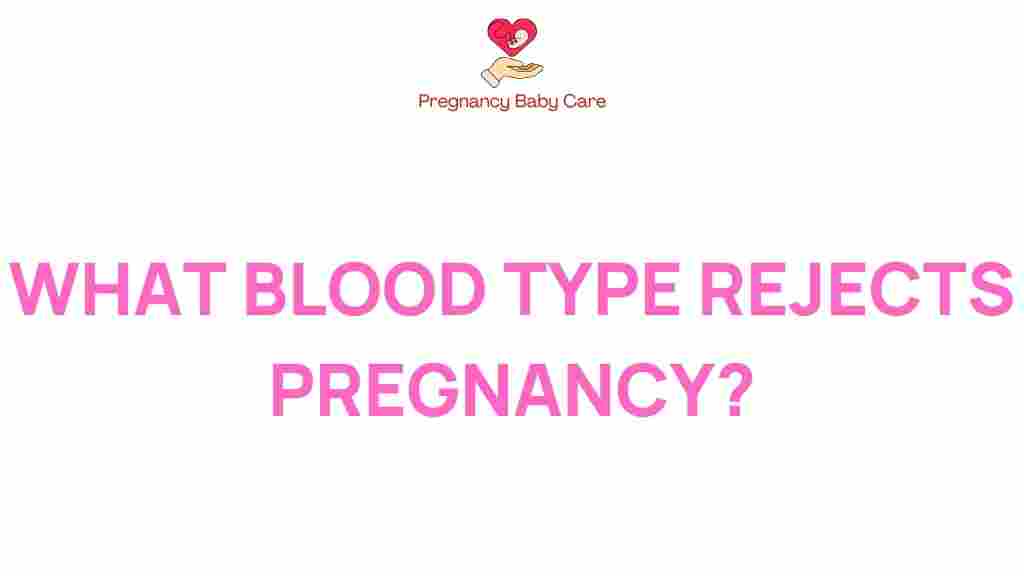Unraveling the Mystery: Which Blood Type Can Reject Pregnancy?
When it comes to pregnancy, many factors influence a woman’s ability to conceive and carry a child to term. Among these factors, blood type plays a crucial role in fertility and maternal health. Understanding the relationship between blood type and pregnancy rejection is essential for expectant parents and healthcare providers alike. In this article, we will delve into the science of blood types, the Rh factor, and how these elements can affect pregnancy outcomes.
What Are Blood Types?
Blood type is determined by specific antigens present on the surface of red blood cells. The primary blood group systems are the ABO system and the Rh system:
- ABO System: This system categorizes blood into four main types: A, B, AB, and O, based on the presence or absence of antigens A and B.
- Rh Factor: This refers to the presence (+) or absence (-) of the Rh D antigen. For example, a person with A blood and the Rh factor is classified as A+.
In total, there are eight primary blood types: A+, A-, B+, B-, AB+, AB-, O+, and O-. Each type has unique characteristics that can influence health, including fertility and maternal outcomes during pregnancy.
The Role of Blood Type in Pregnancy
Blood types can impact pregnancy in various ways, particularly through the interactions of maternal and fetal blood. One critical aspect is the Rh factor, which can lead to complications in some pregnancies.
Rh Incompatibility
Rh incompatibility occurs when an Rh-negative mother carries an Rh-positive baby. This situation can lead to the mother’s immune system producing antibodies against the baby’s red blood cells, potentially causing hemolytic disease of the newborn (HDN). If the mother’s body rejects the pregnancy due to this incompatibility, it can lead to serious health risks for both mother and child.
Genetics and Blood Type: The Science Behind Rejection
The relationship between blood type and the ability to maintain a pregnancy is complex and rooted in genetics. While the ABO blood group system plays a lesser role in pregnancy complications, the Rh factor is a significant concern. Let’s explore how genetics influences these outcomes.
Understanding Genetics
Genetics determines the blood type inherited from parents. Each parent contributes one allele (gene variant) to the child:
- Type A: Can have AA or AO alleles.
- Type B: Can have BB or BO alleles.
- Type AB: Has one A and one B allele.
- Type O: Has two O alleles (OO).
When it comes to the Rh factor, a positive Rh factor is dominant. Therefore, an Rh-positive parent can pass the Rh-positive trait to their child, leading to potential incompatibility if the mother is Rh-negative.
Factors Contributing to Rejection of Pregnancy
Several factors related to blood type and maternal health can contribute to the rejection of pregnancy:
- Rh Factor Incompatibility: As discussed, an Rh-negative mother may reject an Rh-positive fetus.
- Antibody Development: If a mother has previously been sensitized to Rh-positive blood (e.g., through a previous pregnancy or transfusion), her body may produce antibodies, leading to complications.
- Blood Type Compatibility: While the ABO blood group system is less critical, mismatched blood types can sometimes lead to complications, especially during blood transfusions.
Step-by-Step Process: Assessing Blood Type and Pregnancy Health
To understand if blood type could affect pregnancy, follow these steps:
- Determine Blood Type: Both partners should know their blood types and Rh factors. This information is crucial for understanding potential risks.
- Consult with Healthcare Provider: Discuss any concerns regarding blood type compatibility with a healthcare professional, especially if there’s a history of pregnancy complications.
- Monitor for Symptoms: During pregnancy, watch for any unusual symptoms, such as jaundice in the newborn or anemia in the mother, which can indicate Rh incompatibility.
- Receive Preventative Treatments: If the mother is Rh-negative and the baby is Rh-positive, a healthcare provider may recommend Rh immunoglobulin (RhIg) injections to prevent antibody formation.
Troubleshooting Tips for Blood Type-Related Pregnancy Issues
If you encounter problems related to blood type and pregnancy, consider the following tips:
- Regular Prenatal Care: Attend all scheduled prenatal appointments to monitor the health of both mother and baby.
- Healthy Lifestyle Choices: Maintain a balanced diet and avoid smoking and excessive alcohol to support overall health and fertility.
- Genetic Counseling: If there is a family history of blood type complications, seek genetic counseling for personalized guidance.
- Educate Yourself: Stay informed about blood types and pregnancy through reliable sources, such as CDC’s Rh Incompatibility Information.
Conclusion: Understanding Blood Type and Its Impact on Pregnancy
In summary, the relationship between blood type and pregnancy rejection is primarily influenced by the Rh factor. While not all blood types pose a risk, understanding your blood type and that of your partner is essential for a healthy pregnancy. With the right knowledge and healthcare support, many women with Rh incompatibility can have successful pregnancies. If you have concerns about blood type compatibility and its potential impact on fertility and pregnancy, consult with a healthcare professional for personalized advice and support. By being informed and proactive, you can take steps to safeguard maternal health and ensure a positive outcome for your pregnancy.
For more information on blood types and their implications for health and fertility, visit this resource.
This article is in the category Pregnancy and created by PregnancyBabyCare Team
